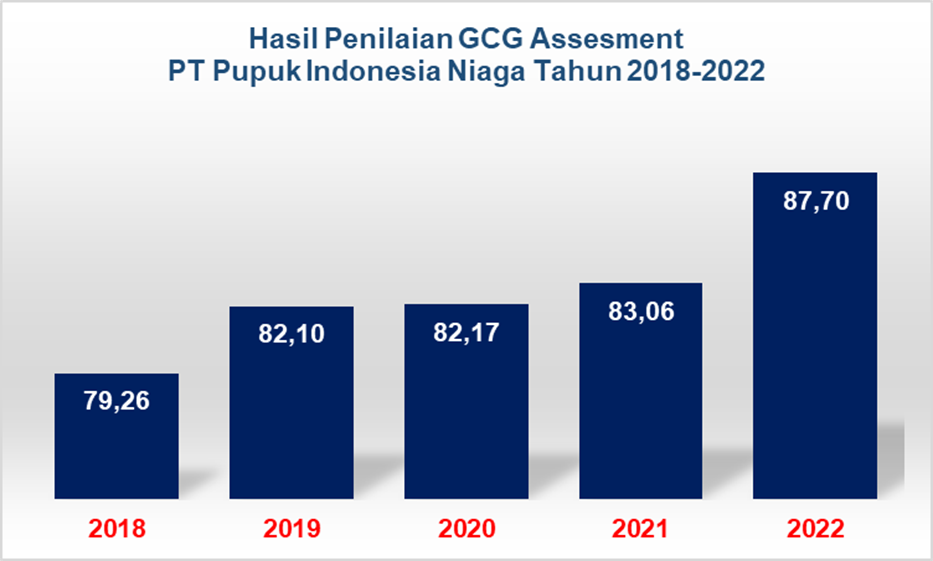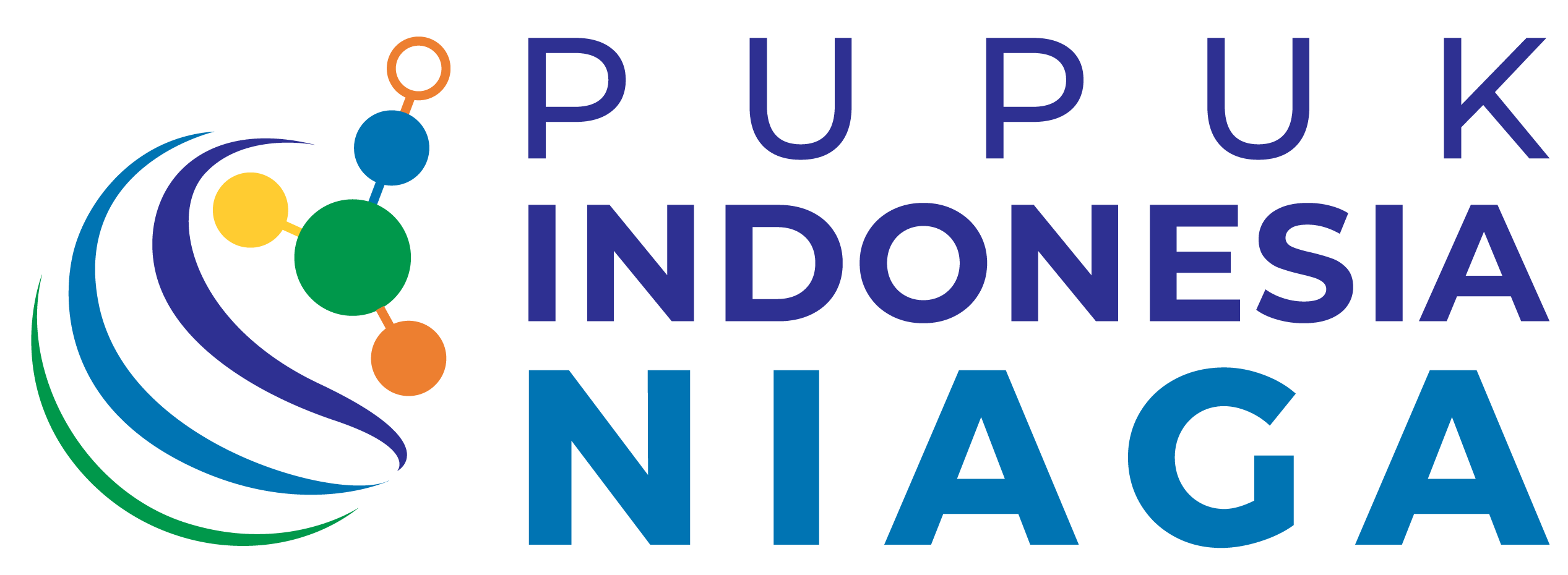GCG at a Glance
GCG
In order to create a company that is highly competitive and continues to grow sustainably, PT Pupuk Indonesia Niaga continues to develop a good corporate governance structure and system (Good Corporate Governance) with reference to transparent principles , accountable, responsible, independent, and fairness (TARIF) in carrying out each of its business activities.
The company believes that consistently implementing GCG aspects can support the company's goals in achieving performance and profitability as well as providing the best added value for all stakeholders. In addition, by upholding the principles of GCG, it will strengthen the company's position in facing business competition, ensure the achievement of long-term business continuity, increase effectiveness and efficiency in managing resources, and increase the trust of stakeholders.
Commitment to the Continuous Implementation of GCG
For PT Pupuk Indonesia Niaga implementing GCG is not just complying with laws and regulations, but rather a fundamental element that underlies every business activity of the Company. PT Pupuk Indonesia Niaga's commitment to implementing GCG includes establishing a GCG responsible function, namely the Corporate Governance & Risk Management Department, implementing integrity pacts in every decision making, developing knowledge for all company personnel regarding implementation GCG, implementation of GCG assessment and evaluation, as well as follow-up on the results of the GCG assessment. The company continuously takes steps to improve both from the soft structure side and from the GCG infrastructure side in order to improve the quality of GCG implementation.
GCG Policy
- Guidelines for Corporate Governance (Code of Corporate Governance)
Guidelines for Corporate Governance (Code of Corporate Governance) is a GCG soft structure that describes the overall system, structure, completeness and scope of GCG implementation in a company. As a manifestation of the Company's commitment to implementing good corporate governance, PT Pupuk Indonesia Niaga has updated the Corporate Governance Guidelines (Code of Corporate Governance) Rev.5 which was approved on 15 September 2022 by the Board of Commissioners and Directors.
- Corporate Ethics Code of Conduct
Dalam rangka menjaga integritas, PT Pupuk Indonesia Niaga telah menyusun Panduan Perilaku dan Kode Etik untuk menjadi acuan bagi Dewan Komisaris, Direksi dan seluruh karyawan di PT Pupuk Indonesia Niaga dalam usaha untuk pencapaian Visi dan Misi Perusahaan. Panduan Perilaku dan Kode Etik ini merupakan wujud komitmen Perusahaan dalam menjalankan dan menjabarkan Budaya dan Nilai-Nilai Perusahaan, yang wajib dipatuhi dan dilaksanakan oleh insan Perusahaan. PT Pupuk Indonesia Niaga telah melakukan pemutakhiran Panduan Perilaku Perusahaan (Corporate Ethics Code of Conduct) Rev.12 yang disahkan pada tanggal 03 Maret 2025 oleh Dewan Komisaris dan Direksi.
- Board Manual Guide for the Board of Commissioners and Board of Directors
Board Manual merupakan suatu Pedoman kerja bagi Direksi dan Dewan Komisaris PT Pupuk Indonesia Niaga dalam menjalankan fungsi dan peran jabatannya dalam menjalankan fungsi dan peran jabatannya sebagai pengemban amanah Perusahaan sesuai dengan Anggaran Dasar dan Peraturan Perundang-Undangan yang berlaku. PT Pupuk Indonesia Niaga telah melakukan pemutakhiran Panduan Board Manual bagi Dewan Komisaris dan Direksi Rev.12 yang disahkan pada tanggal 03 Maret 2025 oleh Dewan Komisaris dan Direksi.
GRATIFICATION CONTROL
PT Pupuk Indonesia Niaga has a strong commitment to the compliance of its people in maintaining the Company's image. All employees of PT Pupuk Indonesia Niaga are prohibited from receiving gratuities that provide personal benefits, themselves and their families, whether received domestically or abroad, as well as those carried out using electronic means or without electronic means.
Komitmen penerapan Pengendalian Gratifikasi tersebut didukung dengan penetapan Pedoman Pengendalian Gratifikasi Rev.5 PT Pupuk Indonesia Niaga yang ditetapkan oleh Direksi nomor : PIN-TSM-PD-011, tanggal 28 Maret 2024. Pedoman tersebut merupakan hasil dari pemutakhiran terakhir sesuai dengan Peraturan Komisi Pemberantasan Korupsi Republik Indonesia No.2 Tahun 2019 tanggal 05 November 2019 tentang Pelaporan Gratifikasi.
Basic principles
All Company personnel who because of their position and contrary to their duties and obligations, and or members of the nuclear family (husband/wife, children) are PROHIBITED from receiving or soliciting or giving gifts in the form of money, gifts/parcels, facilities, and all other forms of gratuity, either directly or indirectly from all of the Company's stakeholders in accordance with the provisions stipulated in the Company Gratification Control Guidelines and applicable laws and regulations.
Gratification Category
The categories of gratification regulated in the Guidelines for Gratification Control include acceptance of gratification, giving of gratification, requests for gratification and refusal of gratification.
- Acceptance of Gratification
Acceptance of gratuities is divided into 3 (three) approaches, namely gratuities that must be reported, gratuities related to official duties, and gratuities that are not required to be reported.
Gratification that must be reported, gratification in this category is acceptance in any form obtained by Company personnel from parties suspected of having a relationship with the recipient's position. Such gratuity must constitute acceptance which is prohibited or legally invalid.
Gratification related to official duties, in official official events or assignments carried out by Company personnel, gifts such as plaques, souvenirs, goody bags/gimmicks and other training facilities are practices that are considered reasonable and do not conflict with applicable ethical standards. Such acceptance is also viewed in the context of relations between companies/institutions/agencies.
Gratification that is not required to be reported, gratification that does not need to be reported is gratification that is generally accepted; does not conflict with the applicable laws; seen as a form of expression of hospitality/respect in social relations within the limits of reasonable value and gifts that are within the realm of customs, habits and norms that exist in society within the limits of fair value.
- Giving Gratification
Giving gratuities that are PROHIBITED are gifts made with the aim of bribery or gratuities that can be considered bribes and giving gratuities to third parties.
- Gratification Request
Company personnel, if asked to provide gratuity that is not in accordance with the provisions of giving, should politely and politely refuse the request by providing an explanation regarding the Gratification Guidelines to the requester and if necessary, submit the Guidelines as part of the socialization of the rules.
- Gratification Rejection
All Company personnel who because of their position and contrary to their duties and obligations, and or members of the nuclear family (husband/wife, children) are PROHIBITED from receiving directly or indirectly gratuities from any party that has a business relationship or is a competitor of the Company. For offers/granting of gratuities that are not in accordance with the provisions stipulated in this Policy, Company personnel must REJECT any such offer/granting by providing an explanation of these rules to the giver. Upon refusal to accept gratuities that have been made, the Company's personnel must report to the Grafts Control Unit.
Manage Gratification
Pengelola gratifikasi perusahaan dilaksanakan oleh Unit Pengendali Gratifikasi yang melekat pada Departemen Tata Kelola, Sisman & Manris, yang telah tertuang dalam Pedoman Pengendalian Gratifikasi Rev.5 PT Pupuk Indonesia Niaga yang ditetapkan oleh Direksi nomor : PIN-TSM-PD-011, tanggal 28 Maret 2024 dengan tugas pokok dan fungsi yaitu mereviu kebijakan, melakukan pemantauan, dan pengendalian gratifikasi, serta melakukan sosialisasi tentang gratifikasi di lingkungan Perusahaan.
Reporting Process
Company personnel or third parties who are aware of a violation can report the violation in accordance with the applicable provisions in the Company through the Gratification Control Unit and/or Whistleblowing System/WBS. The company guarantees that the process of reporting gratuities carried out by Company personnel and third parties will be kept confidential. Reporting of gratification at PT Pupuk Indonesia Niaga uses an application provided by the Indonesian Corruption Eradication Commission (KPK) on an online basis which can be accessed via the address www.gol.kpk.go.id
Sanctions for Violations
Violation of the provisions stipulated in the Gratification Control Guidelines will be subject to sanctions in accordance with the provisions in force in the Company.
LHKPN COMPLIANCE
Wealth Reporting Policy
Dalam rangka mengimplementasikan Kebijakan Good Corporate Governance (GCG) dan Pedoman Etika Perusahaan (Code of Conduct) di PT Pupuk Indonesia Niaga, serta melaksanakan komitmen dari Pemegang Saham, Komisaris, Direksi dan seluruh Jajaran Karyawan PT Pupuk Indonesia Niaga diperlukan adanya aturan yang jelas tentang Laporan Harta Kekayaan Penyelenggara Negara (LHKPN). PT Pupuk Indonesia Niaga sudah memiliki Pedoman Pelaporan Kekayaan Pejabat Rev.4 yang telah disahkan oleh Direksi PT Pupuk Indonesia Niaga dengan nomor: PIN-TSM-PD-009 tanggal 12 Agustus 2024.
The guideline is to provide direction and enforce the provisions on the obligation to submit State Officials Wealth Reports (LHKPN) for the Board of Commissioners, Directors, Grade I, II and III officials within PT Pupuk Indonesia Niaga as well as the Board of Commissioners and Directors of Affiliated Subsidiaries.
All officials within PT Pupuk Indonesia Niaga must comply with the provisions regarding the obligation to submit reports on assets of state administrators.
The person responsible for reporting to the Corruption Eradication Commission (KPK) is the Department of Governance, Sisman & Manrisk.
Scope and Management of Official Wealth Reporting
Berdasarkan Pedoman Pelaporan Kekayaan Pejabat nomor: PIN-TSM-PD-009 tanggal 12 Agustus 2024, adapun yang menjadi Wajib Lapor di PT Pupuk Indonesia Niaga meliputi:
- Board of Commissioners;
- Directors;
- Grade I officials;
- Grade II Officials
- Grade III Officials
All Compulsory Reporters have an obligation to report assets to the Corruption Eradication Commission (KPK) through the e-LHKPN application. The Corporate Governance & Risk Management Department is appointed as the coordinator to provide data and information regarding changes and replacement of Compulsory Reporters within the Company, dissemination of Filling in Officer Wealth Reports and monitoring the level of compliance of Official Wealth Reporting. Company personnel who are included as Compulsory Reporters have been given socialization regarding policies regarding compliance with Official Wealth Reporting. Reporting on the Wealth of Pupuk Indonesia Officials in 2018 has been carried out through the e-LHKPN application.
Determination of Sanctions
Compulsory Reporters who are negligent in carrying out reporting of official wealth, will receive sanctions in the form of verbal warnings for the first stage, written warnings for the second stage, and severe sanctions for the third stage as stipulated in the Guidelines.
GCG IMPLEMENTATION PERFORMANCE
Performance of GCG Implementation at PT Pupuk Indonesia Niaga
PT Pupuk Indonesia Niaga has implemented assessment GCG periodically. In 2020, PT Pupuk Indonesia Niaga has carried out GCG assessment by referring to the Decree of the Secretary of the Minister of SOEs No.SK-16 / S.MBU / 2012 concerning indicators of assessment parameters and evaluation of the implementation of good corporate governance (Good Corporate Governance) in State-Owned Enterprises. GCG assessment at PT Pupuk Indonesia Niaga in 2020 was carried out by Konsultan dari PT Sinergi Daya Prima (SDP). In 2021, PT Pupuk Indonesia Niaga will be conducted a review of assessment which has been carried out in 2020 which refers to the Decree of the Secretary of the Minister of SOEs No.SK-16 / S.MBU / 2012 concerning indicators of assessment parameters and evaluation of the implementation of good corporate governance (Good Corporate Governance) in State-Owned Enterprises.

Score Above 85 = Very Good
Information:
75 ≤ Score < 85 = Good
60 ≤ Score < 75 = Fairly Good
50 ≤ Score < 60 = Less Good
Value < 50 = Not Good
The increase in the GCG implementation assessment score shows evidence of PT Pupuk Indonesia Niaga's commitment to implementing good corporate governance in all of the Company's activities, which are carried out by Shareholders, the Board of Commissioners and the Board of Directors and their subordinates.
